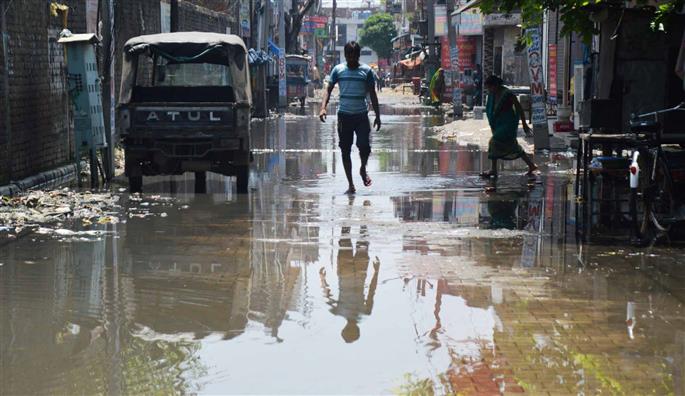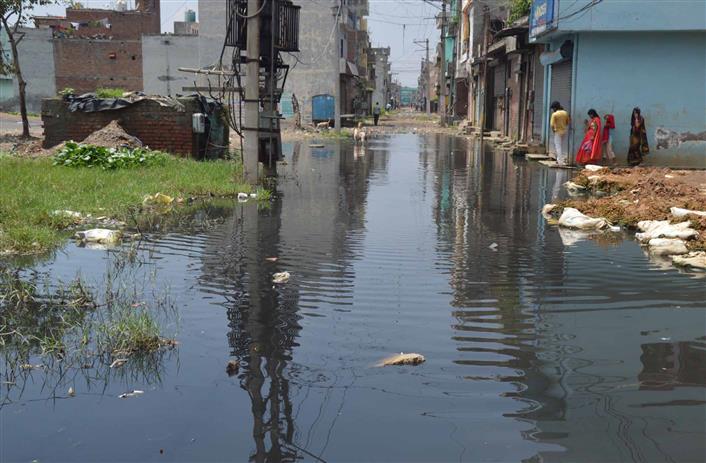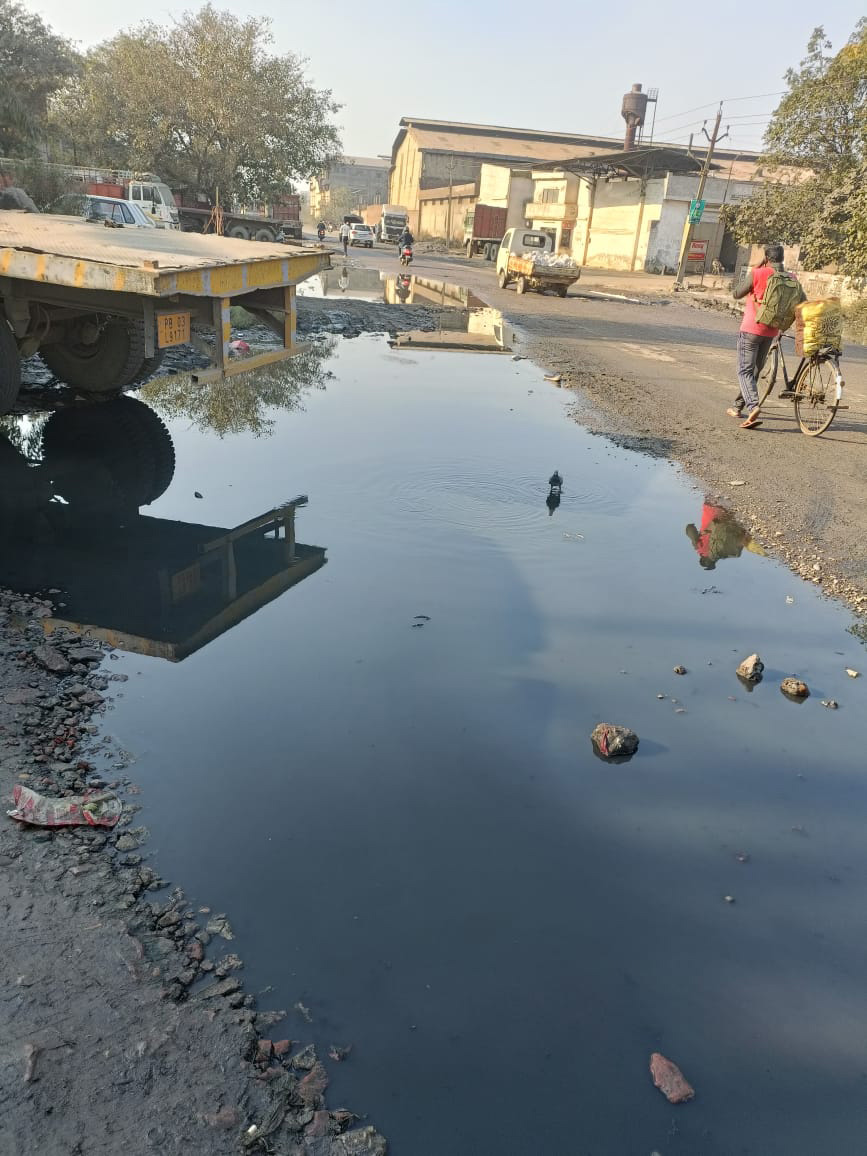
Contractors should be held accountable for poor quality materials used for sewer pipes by suitably penalising them. File photo
MC, residents must work in tandem
The problem of water pollution is common during monsoon. The civic body authorities and residents must work in tandem to overcome the problem. Samples must be collected from sewage water and should be tested for the level of lead in drinking water supply. The civic body must take steps for improved solid waste management. Water filters and testing techniques should be adopted. Heavy penalty should be imposed on those who throw trash into water bodies. Awareness campaigns, rallies etc., must be organised to make people aware of the problem and the threats that it causes.
Shruti Saggar Gambhir
QUESTION
Despite special campaigns being undertaken by the police, the menace of drugs continues to play havoc with the public lives. Huge recovery of drugs from 492 peddlers and smugglers arrested in 361 cases registered under various provisions of the NDPS Act in Ludhiana during the first seven months of this year lays bare the gravity of the drug menace. What needs to be done to free the society of drugs?
Suggestions in not more than 70 words can be sent to [email protected] by Thursday (August 18)
Civic body must chalk out plan
Water is one of the most essential elements on our planet and life is not possible without it. Clean water supply is one of the fundamental rights of our citizens. Flow of contaminated water must be checked from the sources itself. Polluted water with household chemicals and cleaning agents should be thrown into the sink or toilets. The MC authorities must prepare a plan to lay down sewerage and potable water pipes at some distance so that due to any leakage in the pipes, sewage does not get mixed with potable water. A separate system of drainage of rainwater should be developed. Samples of drinking water should also be collected every month in each ward.
Farzana Khan
Mushrooming illegal colonies add to woes
Illegal colonies are mushrooming in the city and it is creating multiple problems for the residents. The Municipal Corporation is mainly responsible for such a mess in and around the city. Efforts must be made to stop this trend. For this, the first step that needs to be taken is that the MC must earmark the land/area where colonies can be built, depending on the factors of availability of clean drinking water etc. and colonies must be built on that land only. Earlier, people used to drink pond water without any hesitation but nowadays people ask for mineral water bottles even at restaurants. It means that water is not fit for drinking from all sources. To wake up political leaders from their deep slumber, it is up to us to spread awareness through blogs, social media platforms and most importantly newspapers. We can also use rainwater harvesting methods to collect water and preserve it to make it fit for drinking. Thus, it is up to us to preserve water and the depleting groundwater levels so that water is available for existence of life on this planet.
Gautam Dev

Apathy of authorities unpardonable
It is a matter of shame that insanitary conditions are prevailing in some colonies of Ludhiana. The contaminated water being supplied there can wreak havoc on the lives of residents. The sewage-laced water is highly toxic, if drunk it can cause not only typhoid and gastroenteritis but also prove fatal. The Health and Municipal Corporation (MC) authorities should be very serious about such deplorable conditions in certain areas of the city. Their apathy is unpardonable.
Dr Sunil Chopra
MC should be held responsible
The gross negligence on the part of civic body officials has forced residents of certain localities to drink sewage-laced water. The civic body officials should be held responsible for this negligence. To check such problems, the administration should immediately take necessary steps. There should be proper disposal of hazardous substances. Rain water harvesting systems should be set up in each and every home.
Adish Sood
Ensure proper drainage and supply
During monsoon, contaminated water mixes with the potable water. This can lead to the spread of waterborne diseases such as diarrhoea, cholera and other serious illnesses such as guinea worm disease, typhoid and dysentery. The Municipal Corporation should supply safe and pure water for consumption purpose. The MC should make sure that there are no leakages in the supply of water. Proper drainage system should be built for rain water and sewerage. Pipes for sewerage and drinking water should be at some distance. The size of pipes should be from 10 to 15 inches and they should be placed deep in the Earth to avoid pressure of heavy loaded vehicles. Frequent digging by telecom companies around the pipes should be avoided. We should also educate people about the bad effects of contaminated water.
Dr Mohd Saleem Farooqui

Authorities have turned a blind eye
Overflowing of sewers in Ludhiana city has been a major problem for a long time and the condition turns worse during the rainy season. Whenever there is heavy rain, the sewage water of the overflowed sewers flows or recedes into the tubewell bores thereby contaminating the fresh water. Transmitting drinking water through pipes that are closer to sewage lines can also lead to mixing of sewage with drinking water. Sometimes the joints between the sewage lines may be leaky which can lead to leakage of sewage thereby contaminating the drinking water. The residents rue that they have been facing trouble due to choked sewer lines and contaminated water supply in their areas during every rainy season. They are forced to drink water laced with sewage. The MC, the Local Bodies Department and the Government authorities have turned a blind eye towards the poor sewerage system and contaminated water supply that pose a threat of outbreak of water-borne diseases like jaundice, diarrhoea, cholera, dengue, malaria, hepatitis A and typhoid. A recent research has shown that the number of people affected by such diseases is highest in slums, followed by Low Income Groups and Middle Income Groups. To resolve the issue, the MC should make the disposal units functional immediately. The newly elected AAP MLAs must take concrete steps for early redressal of such problems of the residents of their respective areas.
RS Sembhi
Penalise the negligent officials
The residents of some areas of Ludhiana city are forced to drink sewage-laced water. This will infect people who are living in these areas. The Municipal Corporation has a special role to play to prevent such a scenario. It should supervise laying of quality sewerage lines. Contractors should be held accountable for poor quality materials used for sewer pipes by suitably penalising them. State Department should check the supervisory work of local authorities regularly. Negligent employees should be held responsible and given exemplary punishment. People should not throw plastic waste in the sewer systems.
Sukhdev Sharma
Conduct regular pipeline testing
It is not uncommon for sewage water to get mixed with potable water, because filthy water permeates into drinking water supply system pipelines when parallel sewage and drinking water pipes begin to leak within close proximity. And when people ingest this contaminated potable water reeked of sewage, they suffer from cholera, typhoid, and dysentery. Without a doubt, water contamination is purely the result of civic officials’ incompetence and a lack of will to investigate the issue holistically. To avoid drinking water contamination, the concerned authorities should conduct regular pipeline testing to identify weak joints. Furthermore, sewage and potable water pipes should be relaid at a distance in a phased manner.
Novin Christopher
Join Whatsapp Channel of The Tribune for latest updates.



























